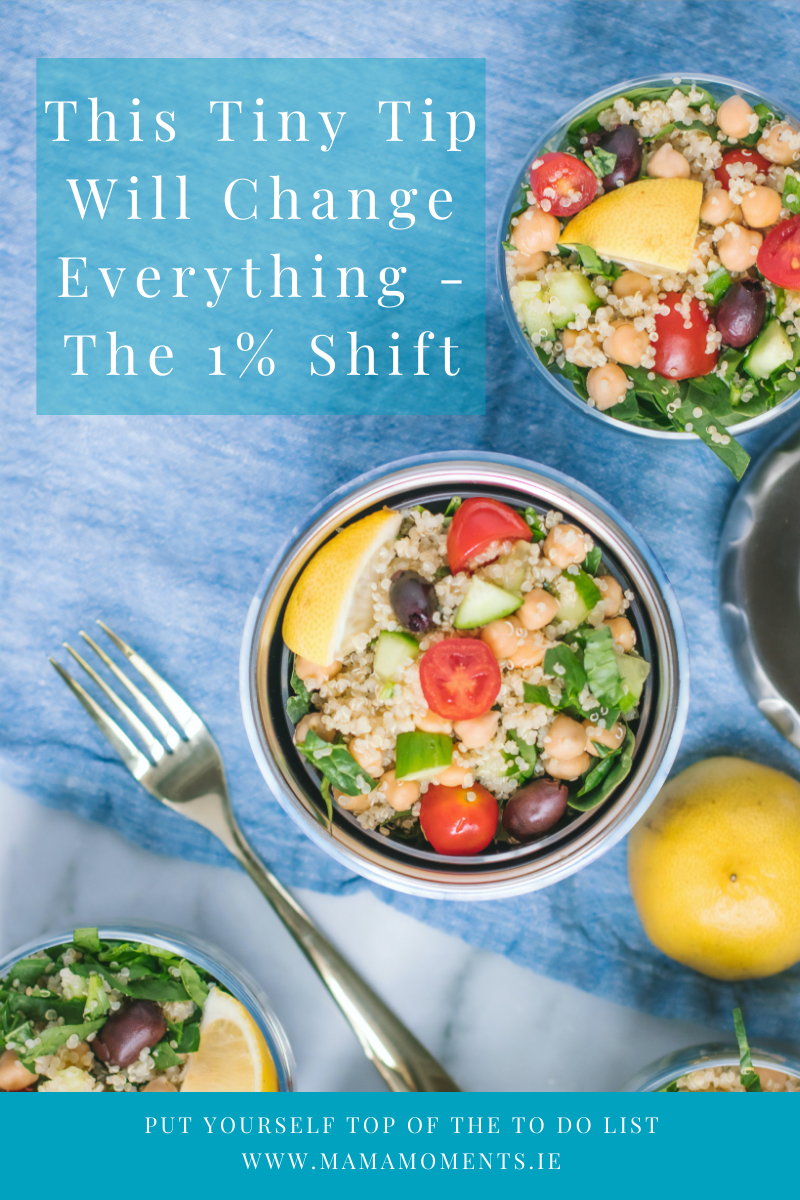
Overwhelm is the killer of motivation and the pusher of procrastination. We have so many things we want to do – from painting the hall, downloading the photos, replacing the lampshades, reorganising the kitchen presses, and hoovering under the beds. It can feel overwhelming and we simply don’t know where to start. We freeze. Nothing gets done but our heads are still on overdrive. The lack of organisation, and the expanding list, may have us thinking we have to start from scratch with an almighty overhaul, but while that’s incredibly daunting it’s also not necessary. There is one effective and simple way to kick start the wheels again and get everything moving. We start small.
The 1% Shift
Where do you want to start? Meal planning? Marie Kondo your drawers? Or organise the hallway so everyone knows where to get their shoes, coats, and bags on the morning rush? There are a lot of things we can do to make our life easier; it’s getting started with those things that’s the problem. Pushing ourselves to find and implement the solutions which will make everything more efficient is usually the hardest part of the process. Our heads are so cluttered with the could and should and would, not even Kondo herself could sort through the lot.
So, we start small. One thing. An ever so slight move in the right direction. In fact, let’s go a little slower. Let’s do one effective shift just once a day. We avoid the pressure of having to do it all now or yesterday, and amazingly you will see the difference as that first thing is added on to the next on day two, and the next on day three, until eventually, you will have found a much easier rhythm in life to getting things done. The big list is not as burgeoning, and we can see progress.
I’ve made that sound quite easy but practically how can we keep going with the 1% shift to get even halfway there and how will it make a difference?
Why It Works?
When we make big decisions, or big promises to ourselves, or when we overburden ourselves with these big tasks, we are setting ourselves up to fail. Big promises have a habit or falling short and ending in a nasty and fairly big disappointment when we don’t hit our target. Making ourselves a little more flexible in our thinking and knowing our limits, allows us to improve on our productivity which in turn helps balance our happiness.
We can easily become distressed by the promises we make ourselves or the things we wish we did but have yet to start on, such as meal planning. We know it will make our life easier, but we struggle to get started because it seems so daunting to be powerfully organised with the family’s food schedule for the week. We remain rigid in our thinking and nothing changes.
When we open ourselves up to the possibility of change, we are showing how we are flexible. Being open to adapting our routines is how we become aware of our motivation to start; which in turn makes it easier to make those small shifts to improve our lives.
Starting small offers us the opportunity to see what we can achieve, to applaud our attempts and to actively see how important these small changes are to our daily lives. A small move has a big impact.
How to Make it Work?
Let’s look at meal planning as our example for tackling the 1% shift. Meal planning can seem a little daunting. It requires forward thinking, a well organised and stocked pantry, and more recipes than you think you have. Or does it? I have a feeling you make meals every day without a second thought, without double checking what’s in the presses and without nipping to the shops every second day. Yes, it can be stressful. Yes, there must be an easier way. And yes, you can adapt.
Take the fear out of meal planning by readjusting it to what you already do. Each of these points are one small step to ticking meal planning off your big list. Start small and soon enough you will naturally be meal planning and the effort and thoughts of daily meals is no longer cluttering your mind.
1. For one week, write down every dinner your family ate. This is the first small step in kickstarting a new routine and habit with meal planning. Getting to know the meals your family love and more importantly, the meals the kids will eat, is a great starting point in managing a successful meal plan.
2. When you next go to do the big shop, bring a list of all the ingredients you need for six of those meals and buy food for one new meal. While shopping you only need to think of one new dinner instead of seven for the next week. Can you feel your mind decluttering already?
3. Write down all of the seven dinners ahead of the week so you are one step ahead. A chalkboard in the kitchen or even a notepad on the fridge can be useful to keep track of your meal planning.
4. Jot down any new meals as and when they come to you. On the off chance your designated nightly dinner has a few noses thrown up at that idea of it, you have a couple of back ups on hand.
5. Add in breakfast ideas when meal planning for dinner becomes a breeze.
6. Oh look, you’re meal planning!
It may seem like you’re getting nowhere by taking a slow and steady approach to big ticket items in your life, but small steps have a powerful way of getting you there faster than if you were to tackle them quickly. Appreciate the time and effort you are putting in to organising those things in life which have a habit of filling our heads. Small steps lead to big changes.

